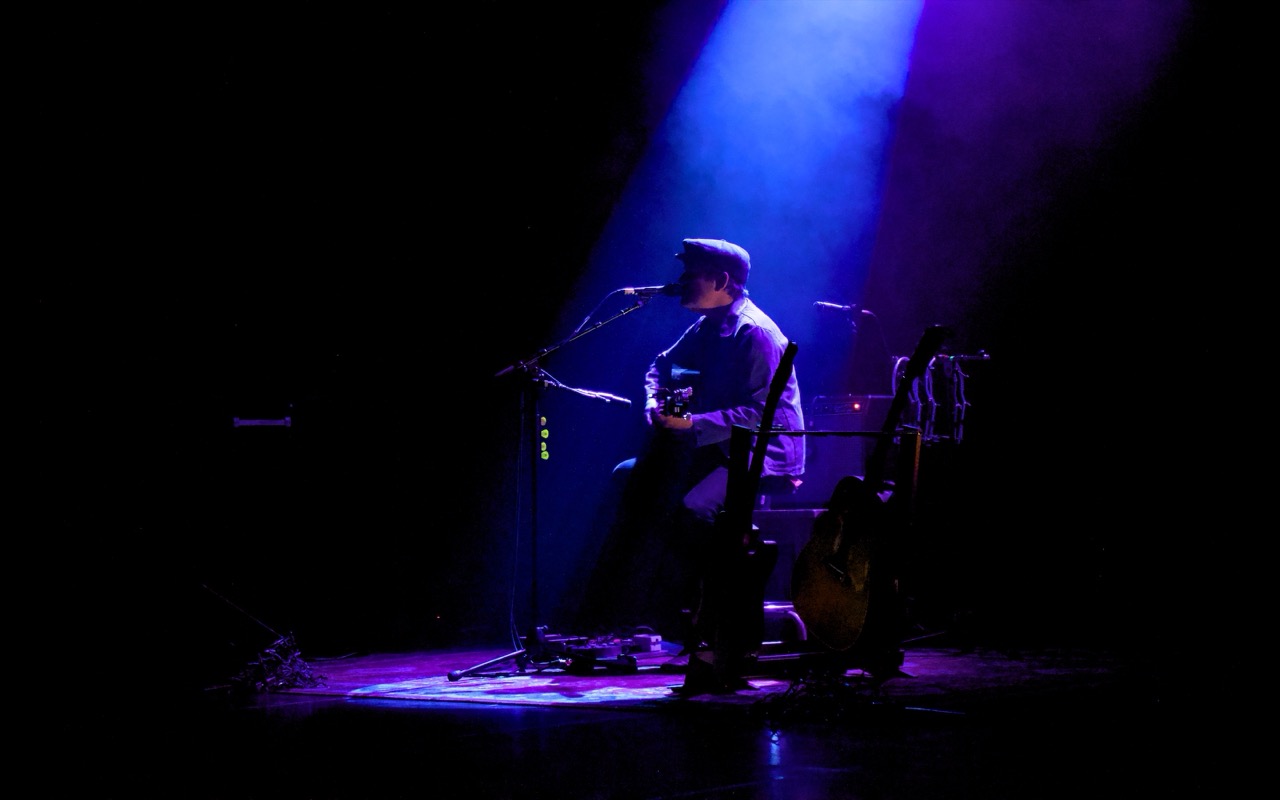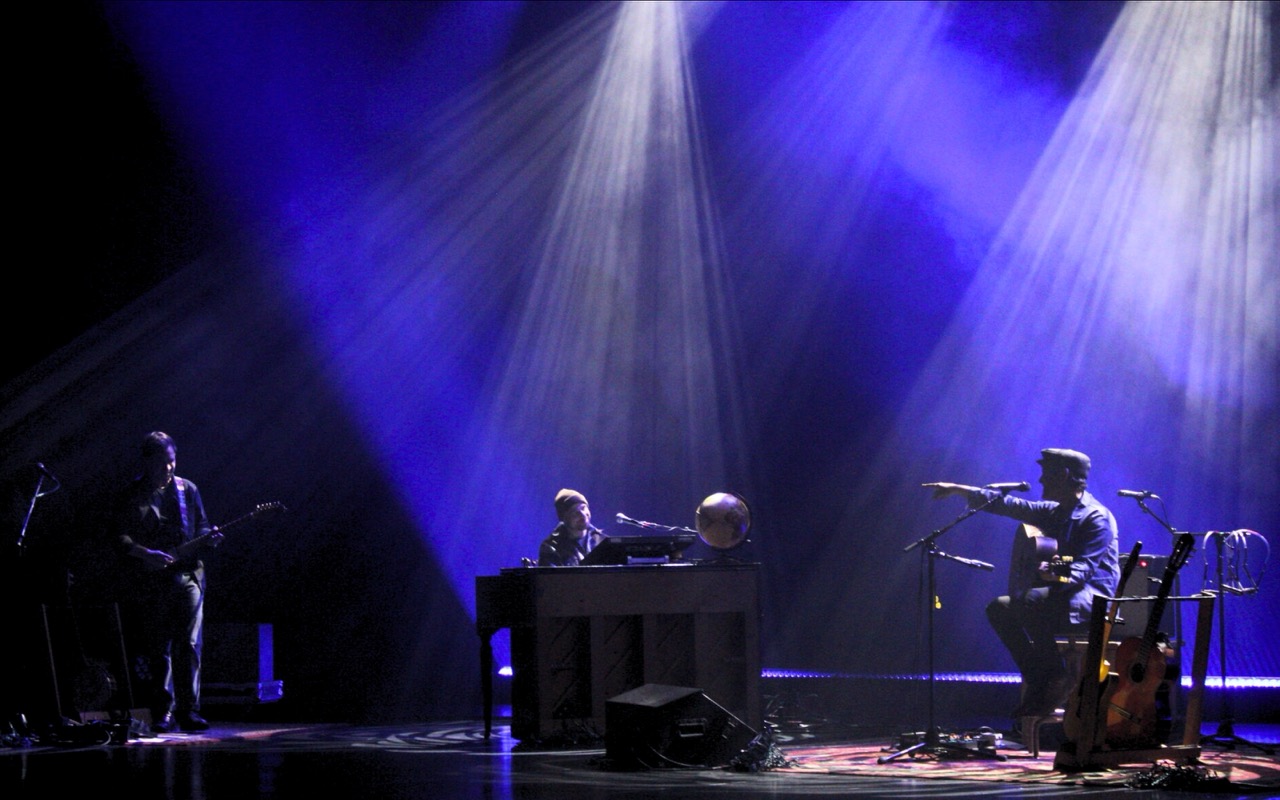The women’s bathroom line at the Majestic Theatre was tightly packed, a slew of middle-aged women in well-worn jeans and 20-something-year-olds in swishing white skirts waiting their turn. The vibe was somewhere on the scale between “twee” and simply “hipster,” comprised of generations of women who’d likely been listening to that night’s artist, Gregory Alan Isakov, since his early folk successes in the 2000s. For some women in that line, that was a small portion of their lives. For others like myself, that chunk of time comprised the majority.
On my way to the stage, I walked past people greeting one another—friends and acquaintances discovered at Americana/folk festivals—and found the theatre’s interior just as chatty. Rows of classic red chairs, in the house a security guard once told me is always cold. Despite the crowd, the chill was quick to set in, so I decided to stay moving and make my way down to the front. After talking for a bit with the other photographers shooting that night, the lights dimmed, and (openers be damned) Isakov himself headed toward the stage.
His first song, “Ash of Our Elders,” was new, and the crowd sat enraptured, overpriced beers and ethically-sourced merch in-hand. It was almost painful to only have his first three songs to shoot—he sat almost entirely still, outside of his between-song chatter. His speaking voice has an unspoken, laughing sort of ease about it, a great match for his stories, quips, and jokes (I’ll never look at Popeyes the same way again).

Isakov didn’t play alone that night. Bringing first his friend Steve Varney to accompany him on various instruments, Isakov stayed still in his chair, calmly strumming away at his guitar, his bunnet pulled down just enough to obscure his face, shrouding it in shadow despite the blue stage lights beaming down on his back.
After Varney, Isakov brought out his brother, Ilan Isakov, to play his own song, “Desdemone.” With one Isakov tinkling away at the piano and the other remaining sat, once again, in his chair, the song was enough to put my non-folk-obsessed partner nearly to sleep—and left the rest of the crowd captivated.
Eventually, after more tickling of ivories and a thoughtful mix of strumming and plucking, Isakov sent his brother off stage right and performed a few songs by himself. His stories remained engaging throughout the breaks between songs, and although they felt longer than most other artists I’ve seen, there was a certain kind of intimacy created by his low-spoken, chuckling personableness.
After a rendition of “Appaloosa Bones”—the last, lingering lyrics being a second repeating of “And the pages slow in the room I called your name”—Isakov, Isakov, and Varney (my favorite legal team) departed the stage, leaving behind a globe on the piano, glowing a warm orange against the dark blue stage lights, an image distinctly reminiscent of Isakov’s popular 2009 album, This Empty Northern Hemisphere.
Photographers were allowed to shoot for the encore, a blessed allowance, considering there hadn’t been a chance to grab photos of the Isakov brothers playing together, or the trio playing as a whole. I waited for the photographer to my right to head down and followed closely behind them. The encore, a cover of Iron & Wine’s song “The Trapeze Swinger,” was played out by Varney on an electric bass or guitar (it was too dark to really tell), Ilan Isakov on piano, and Gregory Alan on his familiar guitar.
For those of us shooting from the pit, we spent the roughly eight minutes that followed darting around the edge of the stage, weaving between one another and trying to find new angles to shoot the same poses from. I found it hard to stay on-task—Isakov and Co.’s rendition of the Iron & Wine classic was, truly, beautiful. By the time the three of them had finished and stood together in a line, arms thrown over and around one another’s shoulders as they bowed, I wasn’t even sure if I’d taken any usable photos. I’d been too distracted; it was far too easy to look up from the lens, awkwardly crouched inches away from the stage, and watch the masterpiece unfold.

By the end of the night, my calves were sore from awkwardly crouching in front of the Majestic Theater’s tall apron, but I was still full of a boundless kind of energy as my plus one and I walked with the crowd back to the parking garage across the street from the theatre. Dusk had passed; it was dark, and the closest Dallas can come to cold, even in February, and honestly, it was the perfect night for a Gregory Alan Isakov concert.










